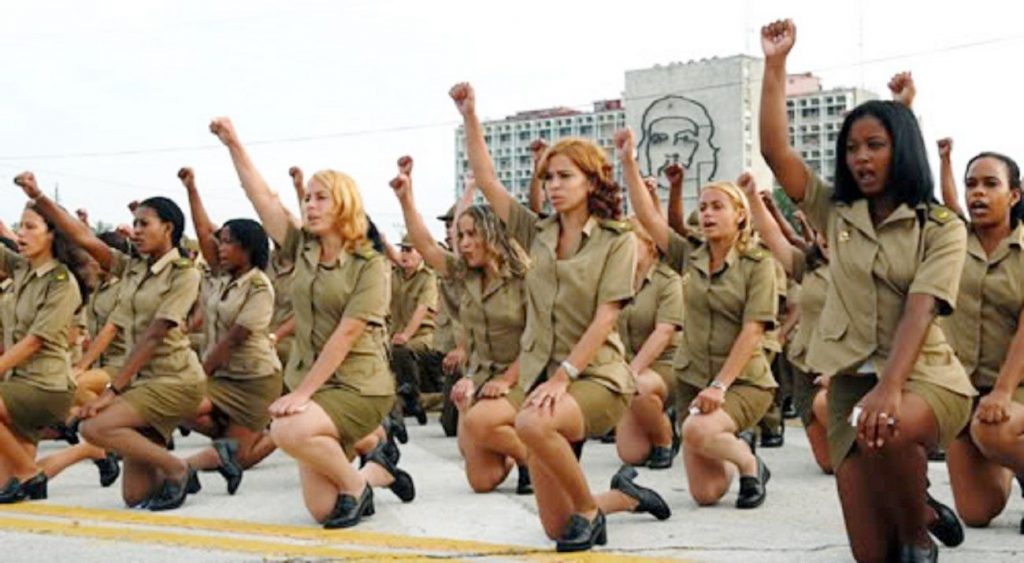
Socialist, or Marxist, feminism is feminism with a class analysis – feminism explored through the angle of class as the primary, and arguably strongest, oppressor. To go back to its very basics, Marxism is the intrinsic knowledge that societies are built on a hierarchy and are unequal – capitalism depends on this inequality.
The capital of a particular area – its wealth, its resources etc – are in the hands of an elite few, whilst the many (the proletariat, the workers) must work for the wages the capitalist gives. The problem here is that the wages the capitalist gives to the worker in exchange for their labour power doesn’t match up to the true value of that labour.
That’s quite abstract, but I’m sure many, if not most in this room, can relate to this idea. An example I like to use is one that was told to me by Holly, where you take a worker in McDonalds earning £8 an hour. In the first 15 minutes of their shift, if they’ve sold 3 combo meals, at £5 each, that is £15 they’ve earned back to the company in profit.
Now obviously the company will have outgoings to make those meals – electricity, rent, water, beef, potatoes etc. But that doesn’t change the fact that within the first 10 minutes of the workers shift, they’ve already earned their hourly wage – the rest of those 50 minutes, they’re working for free. This unpaid labour is termed ‘surplus value’ by Marxists – and is essentially the unpaid wages of the working classes.
This domestic labour lacks the power of traditional labour, in that it cannot be withdrawn in the form of strike action – no mother will let their child go without food or clothes – and capitalism is fully aware of this.
This is how companies are able to make such huge profits, by keeping wages low and the exploitation of unpaid labour high. Now, this definition of surplus value makes enough sense when we take a seemingly concrete enough example of the fast food, or retail, or hospitality worker. But what about the unpaid labour undertaken at home?
Marxist feminists have coined this idea of the ‘double burden’, the idea that women are oppressed in both the public and the private spheres – that is to say at work and at home; the idea that women are oppressed at work through never receiving the full extent of the wage which they are owed, and are then oppressed at home, through something called the double reproduction.
This double reproduction applies to both the physical aspects of reproduction (pregnancy and childbirth) as well as the socialisation of the next generation of workers – a good worker is a compliant one, and so it’s no coincidence that the messages of “don’t hit!; share your toys!; be nice!” is more often said by mothers than fathers. As well as this double reproduction, it is also the role of women in the private sphere to clean, cook, and ensure the workers are kept fed.
Connolly sums this up by saying, “if the male worker is a slave, then the female worker is a slave of that slave.” This domestic labour lacks the power of traditional labour, in that it cannot be withdrawn in the form of strike action – no mother will let their child go without food or clothes – and capitalism is fully aware of this. Thus, I contend that capitalism is dependent on the subjugation of women; through unpaid, domestic labour at home, and a pay gap based on sex differences at work.
Feminism over the years has taken many different stances, from the Marxist feminism of the Soviets following the Russian revolution and the subsequent years of communism. Now, we see a much more liberal, or radical feminism. Both of these have shortcomings, mainly because both don’t strive for any deep, long lasting liberation beyond a superficial ‘freedom’ for a handful of women.
The trouble with radical feminism, from a socialist feminist point of view, is that it doesn’t go any farther. It remains transfixed with the universality of male supremacy — things have never really changed; all social systems are patriarchies; imperialism, militarism, and capitalism are all simply expressions of innate male aggressiveness. And so on. Radical feminism seeks to be better than, or at least equal to, men but it doesn’t acknowledge the very system that keeps men better than women.
Additionally, radical feminism does very little to acknowledge class as any sort of barrier and fails to recognise that a middle-class woman has more societal power than a working-class man. On this, Marxist feminist, Alexandra Kollontai, wrote, “For what reason, then, should the woman worker seek a union with the bourgeois feminists? Who, in actual fact, would stand to gain in the event of such an alliance? Certainly not the woman worker.” She illustrates perfectly here the need for class-based feminism, one which has an analysis of the material conditions which allow for the subjugation of women to arise.
Radical feminist movements, on the other hand, have failed so, because they are so lacking in this class and material analysis of the conditions in which we live – a capitalist patriarchy entirely dependent on the subjugation of women – and this failure to engage with things as they are has meant no success. Equally, liberal feminism has failed in that it seeks to gain surface level liberation for a tiny minority of women – we see this every day through the pushing of the porn and prostitution industries.
Prostitution is not empowering, and neither is the “softer” waves of this we’ve recently seen, such as the rise in Only Fans memberships. It exists because there is both an economic and societal mandate for it, and is built upon the commodification, degradation and exploitation of women’s bodies. Recent attempts to unionise this industry, such as the #AskThe700 campaign in Glasgow have only sought to legitimise this as ‘work’, and not as paid rape – unionising would not help these women, as it isn’t just about poor working conditions; often, attempts to unionise are in line with what the pimps and brothel runners want.
Also, liberal feminism seems to glorify women in power such as Thatcher, and twitter went daft over Hillary Clinton – feminism without class analysis is not feminism, when the capitalist, imperialist policies of Thatcher and the would be policies of Hillary Clinton would have directly impacted on women in their own countries and throughout the world.
Working women need to use our tools and socialisation as caregivers and as reproducers to fight for a better society for all.
To look back at our history, there are many great communist women who fought hand in hand with the man of their class, only to be ignored and forgotten. Women like Rosa Luxemburg, polish revolutionary who led the Spartacist uprising in Germany in 1919. Like Alexandra Kollontai, critique of the family for its role in women’s oppression, writing “capitalism has placed a crushing burden of the shoulders of working women; it makes her a wage worker, but does not lessen her duties at home as a mother and as a housekeeper.”
Women like Mary Barbour and Helen Crawfurd, who in Glasgow, organised the rent strikes of 1915. Celia Sanchez, spearhead of the Cuban revolution and a significant – but forgotten – factor in its success. Communists around the world owe our successes to these women, and they cannot be forgotten or ignored any longer. We need to share their stories with each other, and with the wider movement in order to not only enrich our history, but hopefully start to change the male dominated labour movement. We need working women to fight for the liberation of working women.
So, we have seen what socialist feminism is, and how radical and liberal feminism can never offer true emancipation for working women, as they are too concentrated on the individual. We, as working women, now more than ever, need Marxist, socialist, communist feminism. Working women need to use our tools and socialisation as caregivers and as reproducers to fight for a better society for all.
For these reasons, I conclude that it is only communism which can truly liberate the female class. Socialism offers true emancipation for working women everywhere; not bourgeois feminism which threatens to “break glass ceilings” then sticks those same shards straight in the face of low paid women workers who can’t take on any more hours at work due to ridiculous childcare costs.
We don’t need more female CEO’s, or even more female politicians, we need Marxist feminism, and higher levels of class consciousness. The liberal agenda of late has poisoned our movement, resulting in call out culture – where women are afraid to speak out on women’s issues for fear of rape or death threats – and therefore its more important than ever we turn to socialist feminism for a proper, material analysis of both our struggle and how to change it.
To finish with a quote from Angela Davis, “the only significant steps towards ending domestic slavery have been taken in the existing socialist countries. Working women therefore have a special, vital and vested interest in the struggle for socialism.”
Zoe McKeown



